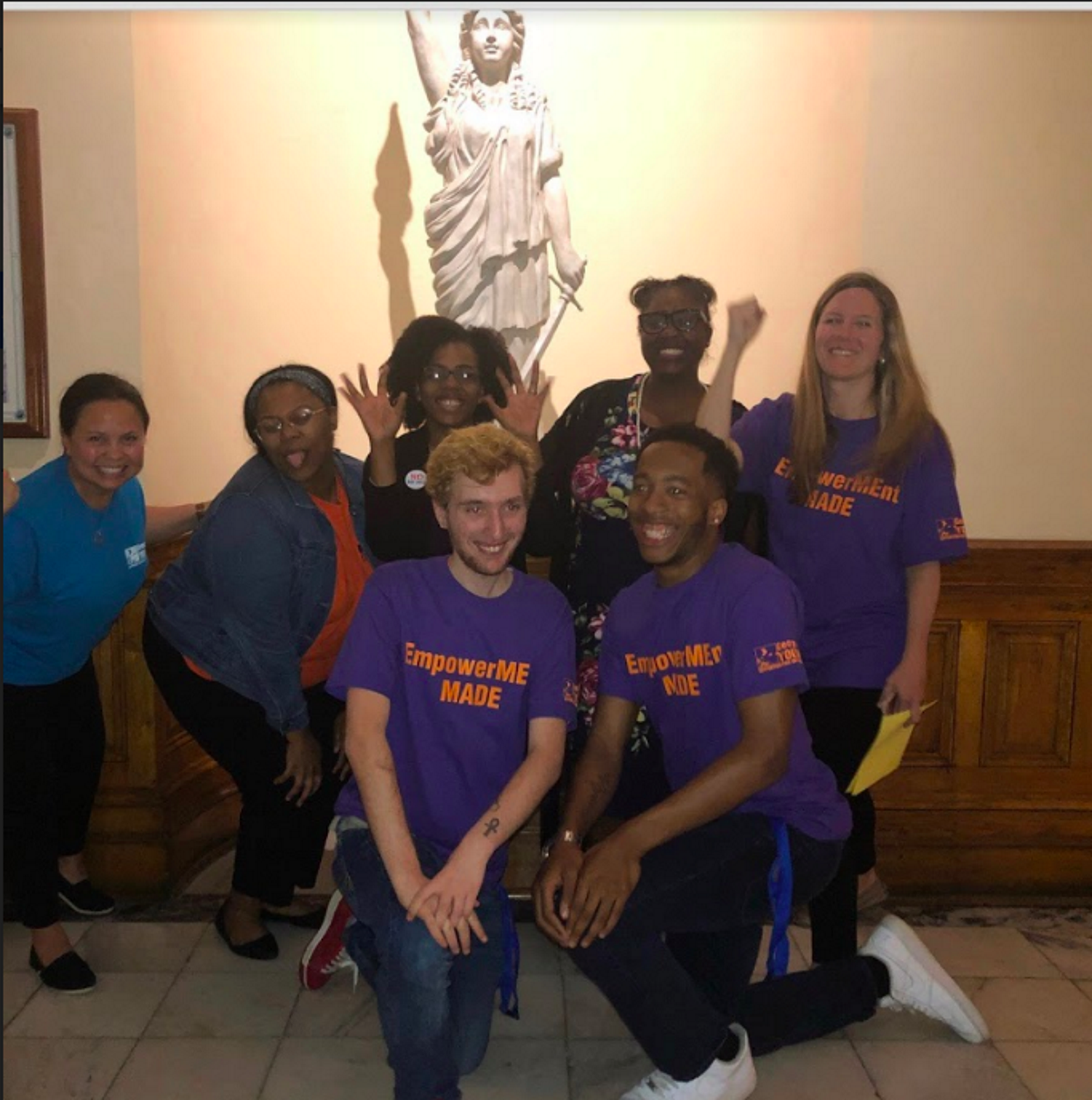Homeless To Empowered: One Girl’s Story Of A Life On The Streets

Ann Campbell, fourth in the back row clockwise, poses with members of the Multi-Agency Alliance for Children’s EmpowerMEnt at the Georgia State Capitol. She shared her story with VOX ATL about being homeless as a teenager. She now works to help youths.
Courtesy of VOX ATL
By Zakirah White
As a teenager, Ann Campbell spent many afternoons concerned about finding a place to rest her head at night rather than complaining about a lengthy school assignment.
She says she was neglected by the foster care system, her social worker, her friends and her own parents.
Like Campbell, there are nearly 2.5 million school-aged children who experience homelessness in the United States, according to the National Center on Family Homelessness. There are at least 3,374 homeless and runaway youths in the Atlanta metro area, a project by Georgia State University shows.
Campbell, now a 23-year-old student attending Georgia Perimeter College, shared her story with VOX ATL.
“So, the first time I experienced homelessness, I was about 17 years old. I had just finished my junior year [of high school]. I was in [foster] care, and I was on my way home. I had reunification with the courts — that means my parents did the counseling, we did the hours, we did the visitations, we did the weekend visits, we did the stay ons and I was able to go home.”
Her stay at home lasted about two weeks.
“My mother and father kicked me out,” she said. “My father told me that I had an ‘expiration date’ to get out of his home, so I left. My journey started in Gwinnett, and I ended up walking to Stonecrest Mall.”
She was vulnerable to both sex and labor trafficking.
“I met a lot of men who took advantage of the fact that I was young and I didn’t know any better. I fell into prostitution at that age, and I was beat almost everyday,” she said. “There were nights that I had to sleep on one side of my body because the other side was too painful to sleep on.”
Campbell adds, “I cried almost every day because I knew I didn’t want to live this life, but I felt like there was no way out.”
Often times, teens experiencing homelessness feel they have to do whatever is necessary for their survival. According to the National Network for Youth, 50 percent of homeless youths ages 16 and older drop out of high school and face many obstacles trying to finish. Youths who are homeless are also likely to be sexually exploited or subject to human trafficking.
“We are living breathing human beings who are here on this earth trying to make a living or make a difference or be successful or even just survive. We just need the right guidance.” – Ann Campbell
When Campbell finally escaped the pimp who was harming her — by running away and getting on a bus — she had little money and no clean clothes.
“I just wanted to feel human again,” she said. “So, I did a little theft. I stole two dresses from the mall, just so I could have somewhat of a wardrobe.”
Eventually, Campbell traveled to Chicago with a woman she met on the train.
“It was toward the end of the summer and school was about to be in session, and that night I stayed up and cried because my education was very important to me.”
“That was the one reason why I got up every day,” she said.
“Most of my life I was told I would never graduate, but I encouraged myself to push through, even though I faced a lot of trials.”
Ultimately, Campbell says, her biggest accomplishment of all was graduating high school.
Campbell reconnected from where she was staying in Chicago with a caretaker from one of the group homes where she was previously placed. That caretaker bought her a bus ticket, came to pick her up and brought her back into care.
“That night I felt safe,” Campbell said. “I felt wanted, and I felt cared for in the right way. Ever since then, I vowed that I would never let myself go through that again, and I didn’t want anyone else to have to either.”
Campbell now works for the Multi-Agency Alliance for Children and has spent the past couple of years advocating for House Bill 972, which raises the age for care from 18 to 21 for some youth.
All of her hard work has paid off: On March 29, the bill passed in the Georgia Senate and has been sent to the governor as part of HB 906.
Campbell is also studying psychology and wants to help children’s mental health.
“When I was in care, I saw a lot of kids having issues and being medicated for them incorrectly,” Campbell said. “So, I decided that I would be the one to advocate for them. I want to prescribe the right medication and not just dope up the child.”
There are teens going through these experiences all around us.
Missing school at days on end, being trafficked by predators who see them as easy targets, sleeping on the streets and struggling to make ends meet on minimum wage. It isn’t hard to be an ally.
“It starts off with listening and being there. More kids in care will open up to you if you show them that you are willing to be there for them,” said Campbell. “The reason why we shut down or [act] submissive or settle for less is because we don’t have anyone looking out or asking us if we are OK or even just asking us how we are.”
She added, “I just wish that all of these companies that come out with independent living, group homes, or foster care facilities that say they want to make a difference would do it for the right reasons and not just the money. Many times people think about a child in care and they wonder how much they are worth. We are not seen as kids in care, instead we are seen with little dollar signs over our heads. Do it for the right reasons because, at the end of the day, we are more than just a check to you.
“We are human beings.”
Zakirah, 17, is a senior at W.D Mohammed High School.
This story was published at VOXAtl.com, Atlanta’s home for uncensored teen publishing and self-expression. For more about the nonprofit VOX, visit www.voxatl.org.








